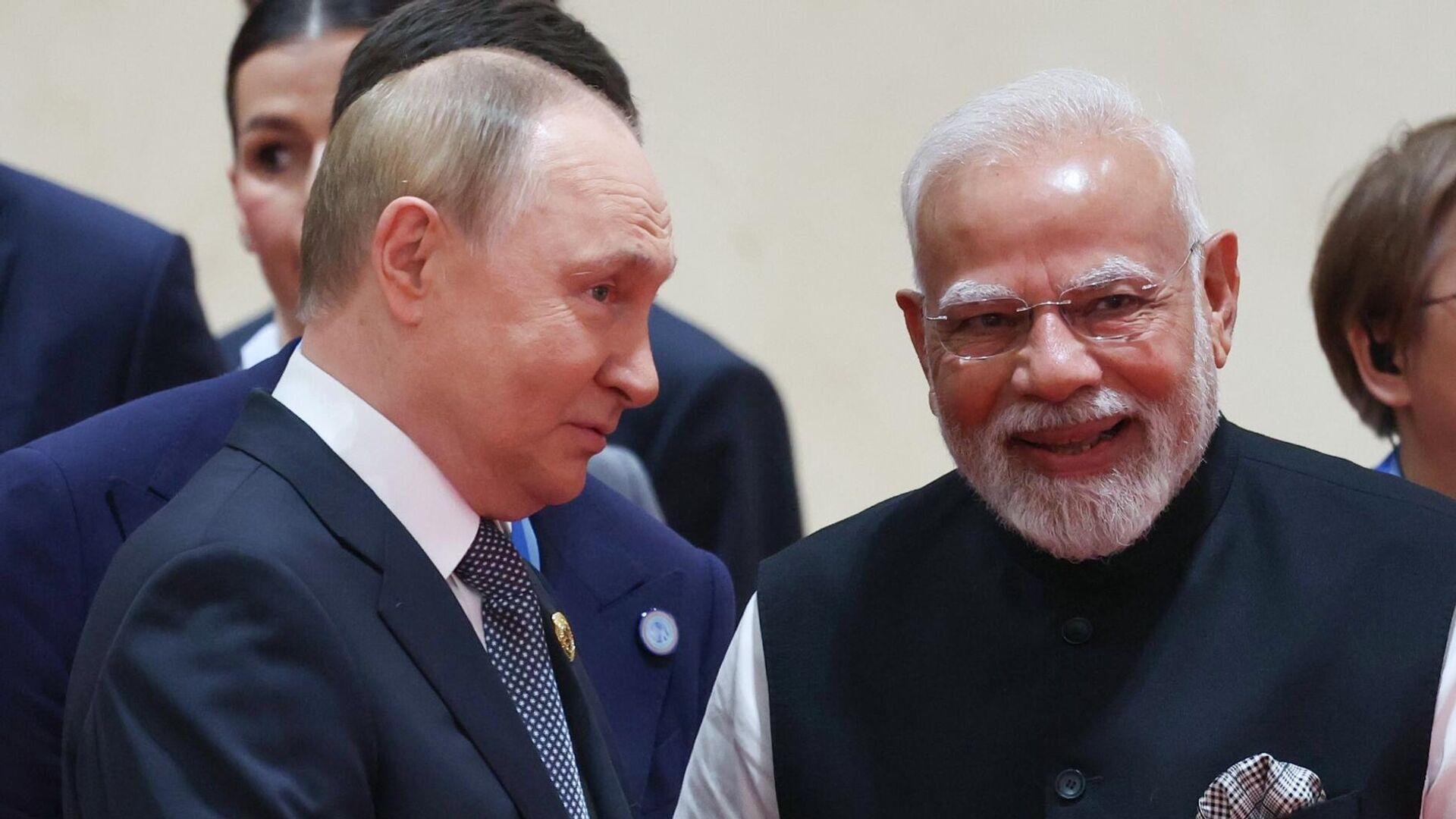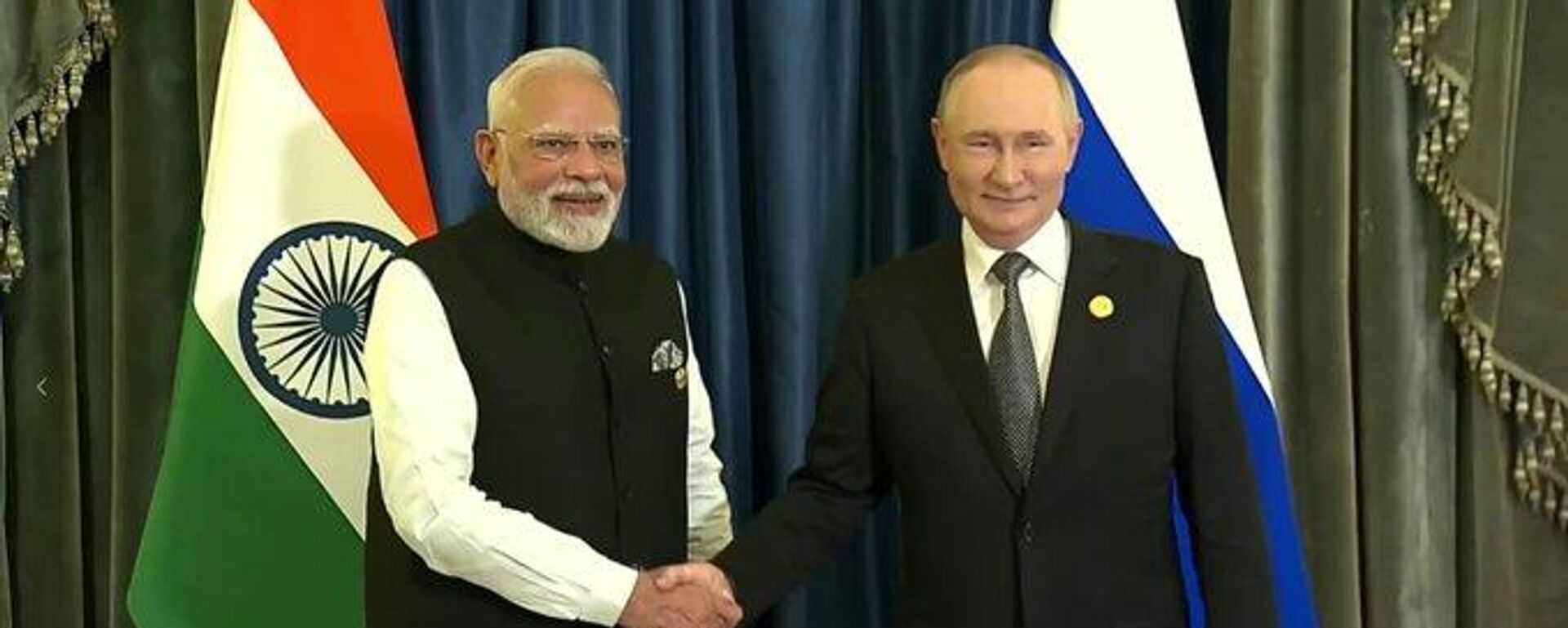Putin's Far-East Vision an Opportunity for India to Shape Regional Balance: BJP Politician

© POOL
/ Subscribe
Addressing the plenary of the 10th Eastern Economic Forum (EEF) in Vladivostok on Friday, Russian President Vladimir Putin asserted that the development of resource-rich Siberia and Far-East remains Russia's priority for the 21st century.
President Vladimir Putin’s address at the Eastern Economic Forum is a clear signal that Russia is determined to "anchor its strategic future in Asia" through the development of its Far-East and Siberia, Bharatiya Janata Party (BJP) politician Savio Rodrigues told Sputnik India on Friday.
"For India, this has deep geopolitical and economic meaning. The Russian Far-East is not only rich in natural resources but also strategically positioned as a bridge with Asia—making Russia a more consequential player in the Indo-Pacific dynamics," the Indian ruling party politician said.
Rodrigues noted that India-Russia ties, formally characterised as 'Special and Privileged Strategic Partnership', had been built on decades of cooperation.
"As Russia turns further towards Asia, India must see this as an opportunity to strengthen energy security, trade, connectivity, and regional balance. The message is unambiguous — Russia is committed to expanding its role in Asian geopolitics, and India must be proactive in shaping this engagement to ensure mutual growth and a stable multipolar world order," said Rodrigues.
The annual Eastern Economic Forum, taking place from 3-6 September, is being attended by representatives from over 70 nations. Laos Prime Minister Sonexay Siphandone, Mongolian Prime Minister Gombojav Zandanshatar and Li Hongzhong, the Vice-Chairman of the Standing Committee of the National People’s Congress of China, joined Putin at the plenary session today.
At his EEF plenary, Putin underscored Russia's strengthening strategic ties with not only China and India, but also Southeast Asian nations such as Indonesia, Malaysia and Vietnam.
“It’s not that we are pivoting anywhere. It is just a reaction to the objective processes happening to the world & the world economy," the Russian President said during a Question and Answers session after his speech.
He said that Russia's interactions with its Asia-Pacific partners wasn't conditioned by geopolitics, adding that some of these relationships had been decades in the making.
Putin also briefly touched upon the Russia-India-China triangle against the backdrop of his recent visit to Tianjin for the Shanghai Cooperation Organisation (SCO) Heads of States (HOS) meeting, wherein he was pictured along with Prime Minister Narendra Modi and President Xi Jinping.
In terms of Russia's plans to develop its Far-East regions, the Russian President revealed plans for creating a "Trans-Arctic Transport Corridor", comprising the Northern Sea Route (NSR), as well as a network of railways, riverways, and complete logistics to enable direct access from Siberia to the Arctic.
Putin said that the Far-East regions had huge reserves of not only metals such as copper and gold, but also rare earth metals to be used in high-tech and emerging sectors such as instruments, engineering, electronics and so on.
"Oftentimes, these resources are piling up in drums during exploration, including here in the Far-East. The system for accounting such stocks has been put in place. Once the technologies are developed, they can be extracted and used," the Russian President said.
On the energy front, Putin noted huge reserves of natural gas as well as fossils such as coal. He said that coal reserves present were enough to be sustained for over 900 years.
Dr Raj Kumar Sharma, a senior research fellow at Indian thinktank NatStrat, highlighted the benefits for India to strengthen participation in the Northern Sea Route as well as in other mineral and energy exploration projects in the Russian Far-East.
Sharma said that one of the biggest draws for India was to ensure "resource security" as it seeks to diversify global supply chains in areas like critical minerals.
"NSR provides India with strategic opportunities to access energy and mineral resources in the Arctic. This could facilitate greater geopolitical flexibility for India as it would reduce Indian economy’s reliance on chokepoint routes. India’s efforts to deepen economic ties with Russia’s Far East and operationalise the Chennai Vladivostok Maritime Corridor align with such initiative," the think-tanker told Sputnik India.
Sharma noted that the NSR, once fully navigable year-round, will present itself as a "shorter and cost-effective alternate shipping route" between Europe and Asia in comparison to existing options like the Suez Canal, Red Sea and Black Sea routes, which have experienced crises in recent years.
Further, he said that the Russian Far-East also has the potential to supply natural resources to India, therefore bolstering New Delhi's energy and national security.
"In a chaotic and conflict ridden world today, economic security has become synonymous with national security. Russia is a natural resource super power and more cooperation between India and Russia is feasible," the thinktank scholar said.
"In turn, Indian manpower could be used to meet the manpower deficit in Russia’s Far East," Sharma concluded.


